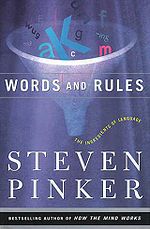
Words and Rules
Encyclopedia

Linguistics
Linguistics is the scientific study of human language. Linguistics can be broadly broken into three categories or subfields of study: language form, language meaning, and language in context....
book by Steven Pinker
Steven Pinker
Steven Arthur Pinker is a Canadian-American experimental psychologist, cognitive scientist, linguist and popular science author...
on the subject of regular
Regular verb
A regular verb is any verb whose conjugation follows the typical grammatical inflections of the language to which it belongs. A verb that cannot be conjugated like this is called an irregular verb. All natural languages, to different extents, have a number of irregular verbs...
and irregular verb
Irregular verb
In contrast to regular verbs, irregular verbs are those verbs that fall outside the standard patterns of conjugation in the languages in which they occur. The idea of an irregular verb is important in second language acquisition, where the verb paradigms of a foreign language are learned...
s. In Pinker's words, the book "tries to illuminate the nature of language and mind by choosing a single phenomenon and examining it from every angle imaginable." His analysis reflects his view that language and many other aspects of human nature are innate evolutionary-psychological
Evolutionary psychology
Evolutionary psychology is an approach in the social and natural sciences that examines psychological traits such as memory, perception, and language from a modern evolutionary perspective. It seeks to identify which human psychological traits are evolved adaptations, that is, the functional...
adaptations. Most of the book examines studies of the form and frequency of grammatical errors in English (and to a lesser extent in German) as well as the speech of brain-damaged
Brain damage
"Brain damage" or "brain injury" is the destruction or degeneration of brain cells. Brain injuries occur due to a wide range of internal and external factors...
persons with selective aphasia
Aphasia
Aphasia is an impairment of language ability. This class of language disorder ranges from having difficulty remembering words to being completely unable to speak, read, or write....
.
The title, Words and Rules, refers to a model Pinker believes best represents how words are represented in the mind. He writes that words are either stored directly with their associated meanings, in a "mental dictionary", or constructed using morphological rules. Leak and rose, for example, would be stored as mental dictionary entries, but the words leaking and roses do not need to be memorized separately, as they can be easily constructed by adding the appropriate suffix
Suffix
In linguistics, a suffix is an affix which is placed after the stem of a word. Common examples are case endings, which indicate the grammatical case of nouns or adjectives, and verb endings, which form the conjugation of verbs...
es. By analyzing the English errors children make (such as overgeneralizing morphological rules to create words like mouses and bringed), he concludes that irregular verbs are not remembered in terms of the rules that produce them (such as the rule that produces sleep/slept, weep/wept, keep/kept, etc.), and instead have their past tenses memorized directly.
The words and rules model contradicts previous ideas (both connectionist
Connectionism
Connectionism is a set of approaches in the fields of artificial intelligence, cognitive psychology, cognitive science, neuroscience and philosophy of mind, that models mental or behavioral phenomena as the emergent processes of interconnected networks of simple units...
and Chomskyan
Noam Chomsky
Avram Noam Chomsky is an American linguist, philosopher, cognitive scientist, and activist. He is an Institute Professor and Professor in the Department of Linguistics & Philosophy at MIT, where he has worked for over 50 years. Chomsky has been described as the "father of modern linguistics" and...
) hypothesizing that irregular past tenses are the result of rules applied based on phonological similarities. Pinker accepts a weak form of the connectionism model to explain the origin of the small number of recent irregular verbs that obtained their past tenses due to surface similarity to other already-irregular verbs. However, Pinker shows research showing these sorts of generalization to be exceedingly rare in comparison to the overapplication of regular past tense rules ("add '-ed'") to words with irregular past tenses. His research also examines past-tense formation among German speakers, further supporting his conclusion.
"Words and Rules" is also the title of an essay by Steven Pinker outlining many of the topics discussed in the book.
External links
- Pinker's website on Words and Rules
- "Words and Rules" by Steven Pinker (PDFPortable Document FormatPortable Document Format is an open standard for document exchange. This file format, created by Adobe Systems in 1993, is used for representing documents in a manner independent of application software, hardware, and operating systems....
) — Complete text of the essay "Words and Rules" - Dig-dug, think-thunk by Charles Yang, a critical review of Words and Rules

